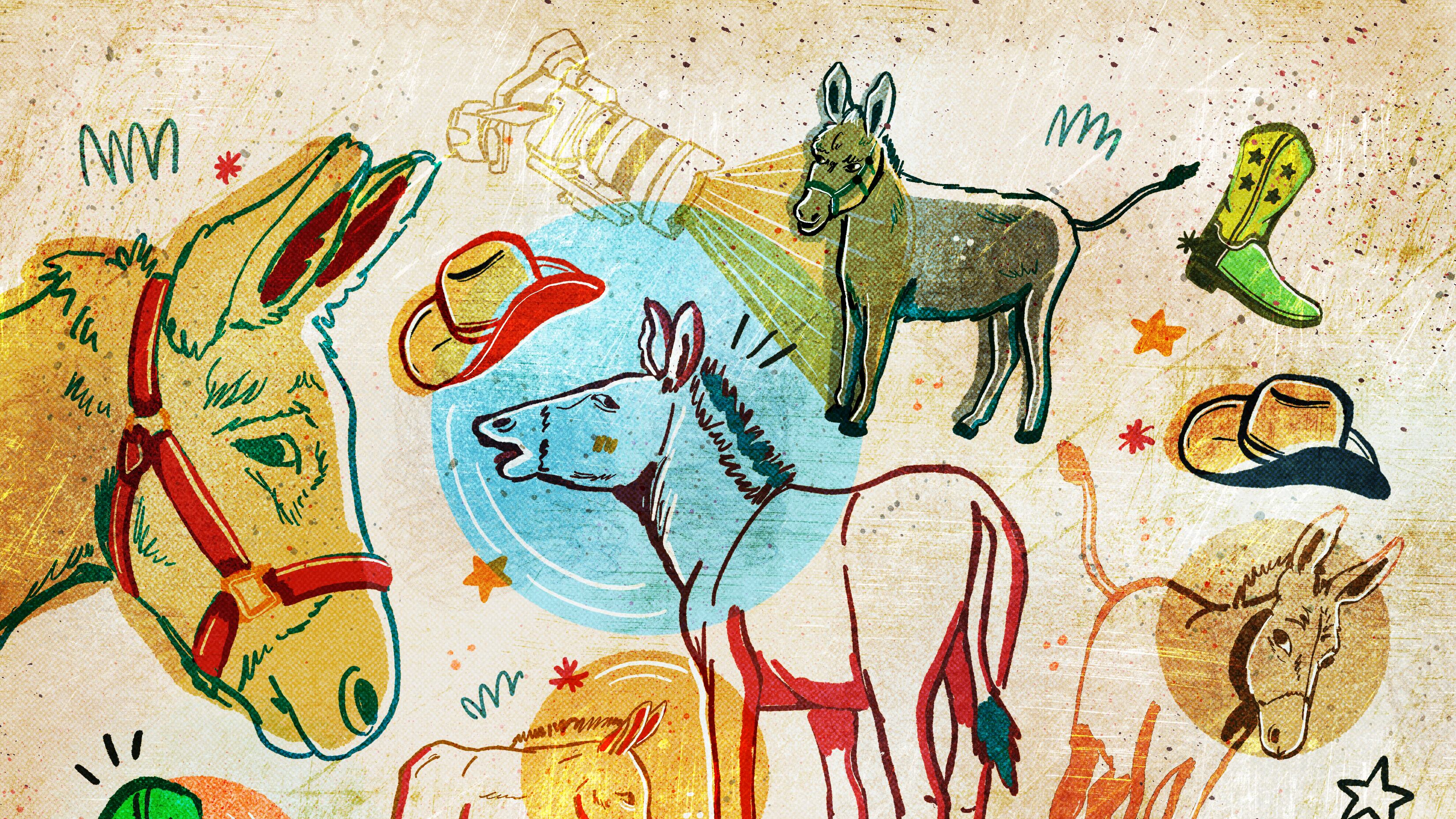They may not be Hollywood royalty, but donkeys made it to the Oscars this past March.
They appeared in three Oscar-nominated films: EO, The Banshees of Inisherin and Triangle of Sadness. An actual donkey—who host Jimmy Kimmel claimed to be Jenny from Banshees but was really Dominic from L.A.—even made it onstage. Jenny wasn’t available; in an uncharacteristic-of-humans act of grace toward donkeys, producers paid for her retirement from public life post-Banshees.
No horse has graced the Oscars stage, yet they’ve dominated the screen. What’s widely considered the first film—Eadweard Muybridge’s 1878 Sallie Gardner at a Gallop—featured just horse and man.
Donkeys aren’t absent from stories, though. For a small sampling, the Bible mentions them dozens of times, and they’re in the Quran, Cervantes’ Don Quixote, Shakespeare’s plays, and at least 87 films, according to Mubi. But there is a world of difference in the characterization of horses and donkeys on film.
Ben-Hur (1959) has its iconic chariot race showing the unbreakable power of the horse. Spirit: Stallion of the Cimarron (2002) centers on the unbreakable spirit of the horse. The Black Stallion (1979) explores the unbreakable friendships between humans and horses.
Stories with donkeys, on the other hand, are generally about a broken creature and a broken human-animal relationship. Donkeys typically appear when needed for comic relief or labor, or as objects of abuse and neglect.
Both Polish director Jerzy Skolimowski’s EO and its inspiration—director Robert Bresson’s Au Hasard Balthazar (1966)—predominantly use donkeys to comment on human nature. But what about the nature of donkeys themselves? Turns out, it’s chronically misrepresented.
Enter the experts at the Oregon Donkey Sanctuary. In 2006, Rhonda and Jim Urquhart moved to Oregon City. A big-spirited, Texas-born woman frequently seen in coveralls and almost always in muck boots, Rhonda and her good-natured, joke-ready husband Jim opened ODS in 2021.
Their 40-acre Oregon City farm was a satellite of Peaceful Valley Donkey Rescue for years. Eventually, it evolved into ODS, a forever home for donkeys in need. And in 2023, the sanctuary received the Oregon Humane Society’s Diamond Collar Award.
For the record, Rhonda Urquhart insists that donkeys are not stubborn but highly intelligent, with a strong instinct for self-preservation.
“They’ll pause to evaluate a situation. If a donkey doesn’t feel safe, they will freeze [and] analyze,” she says. “This action gives them their ‘stubborn’ reputation and is why many are abused by the impatient nature of humans.” Some 15 volunteers at ODS agree that donkeys’ reputation as biting, kicking asses is far from the truth.
Rhonda had horses her entire life, until she engaged with donkeys. She’s deeply familiar with and appreciates both, conceding, “Horses are graceful, magnificent, majestic beings. Their stature and movement is a beautiful, flowing, waltzlike dance. Donkeys are more of a two-step line dance at a country bar after a few beers.”
What donkeys lack in graceful movement, they make up in grace of heart. “If you immerse your stare into a donkey’s eyes you can feel them looking directly into your being,” Urquhart says. “It’s hard to describe unless you’ve felt it...the horse will win ‘sexy’ every time! The soulfulness and kindness of a donkey is beyond.”
When treated with patience and respect by humans, donkeys can share strong, mutually beneficial, even co-therapeutic relationships with humans. Urquhart offers a powerful example.
“We had an autistic nonverbal 7-year-old boy visit,” she says. “He had never spoken. He was loving on [the late donkey] Pearl, and his parents asked if he was having fun. He looked at them and said, ‘I love.’ These were the first words he had ever spoken.”
The Urquharts live for these moments, and ODS’s ultimate goal is to become a therapy center. In the meantime, if you want to meet some donkeys and learn more about the sanctuary, visiting season opens each spring, and the public is always welcome at their interactive fundraisers, like their upcoming plant sale.
GO: Oregon Donkey Sanctuary, 15900 S Thayer Road, Oregon City, 503-826-7535, oregondonkeys.org. Spring plant sale is Saturday, June 3.
